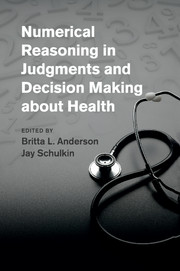
-
Select format
-
- Publisher:
- Cambridge University Press
- Publication date:
- July 2014
- June 2014
- ISBN:
- 9781139644358
- 9781107040946
- 9781107612587
- Dimensions:
- (228 x 152 mm)
- Weight & Pages:
- 0.58kg, 327 Pages
- Dimensions:
- (229 x 152 mm)
- Weight & Pages:
- 0.49kg, 330 Pages
- Subjects:
- Psychology, Cognition, Health and Clinical Psychology
You may already have access via personal or institutional login- Subjects:
- Psychology, Cognition, Health and Clinical Psychology
Book description
Every day thousands of individuals need to make critical decisions about their health based on numerical information, yet recent surveys have found that over half the population of the United States is unable to complete basic math problems. How does this lack of numerical ability (also referred to as low numeracy, quantitative illiteracy or statistical illiteracy) impact healthcare? What can be done to help people with low numeracy skills? Numerical Reasoning in Judgments and Decision Making about Health addresses these questions by examining and explaining the impact of quantitative illiteracy on healthcare and in specific healthcare contexts, and discussing what can be done to reduce these healthcare disparities. This book will be a useful resource for professionals in many health fields including academics, policy makers, physicians and other healthcare providers.
Reviews
‘This topic is highly relevant to efforts at improving the application of evidence-based medicine, as well as patient adherence and patient empowerment through collaborative decision-making. Teaching physicians about numeracy and providing them with practical ways of enhancing patient numeracy are also extremely useful contributions to the literature.’
Charles J. Lockwood - The Ohio State University College of Medicine
‘This book now stands as the definitive collection of thinking - both theoretical and applied - on the relationship between numerical reasoning and medical decision-making. A marvellous collection of chapters, each of which stand strong on their own, but that also come together as more than the sum (I had to make a math reference!) of their parts.’
Peter A. Ubel - Duke University, North Carolina
Contents
Metrics
Full text views
Full text views help Loading metrics...
Loading metrics...
* Views captured on Cambridge Core between #date#. This data will be updated every 24 hours.
Usage data cannot currently be displayed.
Accessibility standard: Unknown
Why this information is here
This section outlines the accessibility features of this content - including support for screen readers, full keyboard navigation and high-contrast display options. This may not be relevant for you.
Accessibility Information
Accessibility compliance for the PDF of this book is currently unknown and may be updated in the future.


